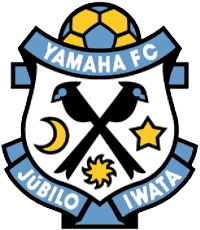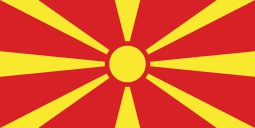Júbilo Iwata
Júbilo Iwata (Japanese: ジュビロ磐田, Hepburn: Jubiro Iwata) is a professional Japanese association football team that currently play in the J2 League. The team name Júbilo means 'joy' in Spanish and Portuguese. The team's hometown is Iwata, Shizuoka prefecture and they play at Yamaha Stadium. For big fixtures such as the Shizuoka Derby with Shimizu S-Pulse and against some of the top teams in J1, Júbilo play at the much larger Ecopa Stadium in Fukuroi City, a venue built specifically for the 2002 FIFA World Cup finals. They practice at Okubo Ground in Iwata and Iwata Sports Park Yumeria.[2]
 | |||
| Full name | Júbilo Iwata | ||
|---|---|---|---|
| Nickname(s) | Júbilo | ||
| Founded | 1972 | ||
| Ground | Yamaha Stadium, Iwata, Shizuoka | ||
| Capacity | 15,165[1] | ||
| Owner | Yamaha Motor Company | ||
| Chairman | Yoshirou Takahira | ||
| Manager | Fernando Jubero | ||
| League | J2 League | ||
| 2019 | J1 League, 18th (relegated) | ||
| Website | Club website | ||
|
| |||
Between 1997 and 2003 Iwata were one of the most successful teams in the J. League. Over this seven-year spell Jubilo finished outside the top two of J1 just once, winning the league title on three occasions. This period also saw a number of cup final appearances, including winning the Emperor’s Cup, the J. League Cup, and the Asian Champions League once each.
History
Origins and rise to the top
The team started out as the company team for Yamaha Motor Corporation in 1970. After making its way through the Shizuoka and Tōkai football leagues, it played in the Japan Soccer League until it reorganized as the J.League at the end of 1992.
Their first glory happened when they won both the Emperor's Cup and promotion as champions of the JSL Division 2 in 1982. They won their first Japanese league title in the 1987/88 season. Due to problems in the upcoming professionalization, Yamaha decided to relegate themselves and not be one of the J.League founder members.
They finished in 2nd place of the JFL 1st division, a division below the top flight, in 1993 and were promoted to the J1 league for 1994. The team welcomed Marius Johan Ooft as its manager, as well as the Brazilian national team captain Dunga and a number of foreign players to build a winning team.[3] Dunga's football philosophy deeply influenced the club, initially as a player and currently as an advisor.
Glory years
In a seven-year period between 1997 and 2003, the club won a number of titles relying on Japanese players instead of foreigners who may leave on a transfer during the middle of the season. Within this period Júbilo won the J.League title three times, finished second three more and won each of the domestic cup competitions once. In 1999 they were also crowned Champions of Asia after winning the final match against Esteghlal F.C. and 121.000 spectators in Azadi Stadium.
In one of the most fruitful periods in J.League history, Júbilo broke several records and created some new ones. Amongst these are the most goals scored in a season (107 in 1998); the fewest goals conceded in a season (26 in 2001); the biggest goal difference (plus 68 goals in 1998); and the largest win (9–1 against Cerezo Osaka in 1998).[4] In 2002, the team won both stages of the championship, a first in J.League history, and the same year the team had a record seven players selected for the J.League Team of the Year. All of these records still stand today.
Today
Since their last cup triumph in the 2003 Emperor's Cup, the squad which took them to such heights began to age. Without similarly skilled replacements coming through the youth team or from outside, Júbilo's power started to fade, and in 2007 the club ended the season in a record worst position of 9th. Perhaps more concerning to Júbilo supporters is their eclipse in recent seasons by bitter local rivals Shimizu S-Pulse who, in ending the season above Júbilo every year since 2006, have become Shizuoka prefecture's premier performing team. In 2008 they finished 16th out of 18 – their lowest position in the 18-club table – but kept their J1 position by defeating Vegalta Sendai in the promotion/relegation playoff.
In 2013 season, it took them until 8th week to make their first win in the league matches, and never move up higher than 16th since they were ranked down to 17th as of the end of 5th week. Then eventually suffered their first relegation to 2014 J.League Division 2 after they were defeated by Sagan Tosu at their 31st week match. Júbilo were promoted back to J1 in 2015 after finishing runners-up.
Honours
DomesticJúbilo Iwata (Professional era)
Yamaha (Amateur era)
|
International
|
Rivalries
Júbilo's closest professional rivals are S-Pulse from Shizuoka.[5] Júbilo also has rivalries with Kashima Antlers and Yokohama Marinos, with whom they traded the Japanese league championship since the late 1980s. During the Japan Soccer League days they had a more local derby with Honda, across the Tenryu in Hamamatsu, but as Honda has long resisted professionalism, competitive matches between them since 1994 are a rarity.
Record as J.League member
| Season | Div. | Tms. | Pos. | Attendance/G | J.League Cup | Emperor's Cup | Asia | |
|---|---|---|---|---|---|---|---|---|
| 1994 | J1 | 12 | 8 | 14,497 | Final | 1st round | – | – |
| 1995 | J1 | 14 | 6 | 17,313 | – | 2nd round | – | – |
| 1996 | J1 | 16 | 4 | 13,792 | Group Stage | 3rd round | – | – |
| 1997 | J1 | 17 | 1 | 10,448 | Final | Semi-final | – | – |
| 1998 | J1 | 18 | 2 | 12,867 | Winner | Quarter-final | – | – |
| 1999 | J1 | 16 | 1 | 12,273 | Quarter-final | Quarter-final | CC | Winner |
| 2000 | J1 | 16 | 4 | 12,534 | Quarter-final | Quarter-final | CC | Final |
| 2001 | J1 | 16 | 2 | 16,650 | Final | 4th round | CC | Final |
| 2002 | J1 | 16 | 1 | 16,564 | Quarter-final | Quarter-final | – | – |
| 2003 | J1 | 16 | 2 | 17,267 | Semi-final | Winner | – | – |
| 2004 | J1 | 16 | 5 | 17,126 | Group Stage | Final | CL | Group Stage |
| 2005 | J1 | 18 | 6 | 17,296 | Quarter-final | Quarter-final | CL | Group Stage |
| 2006 | J1 | 18 | 5 | 18,002 | Quarter-final | Quarter-final | – | – |
| 2007 | J1 | 18 | 9 | 16,359 | Group Stage | 5th round | – | – |
| 2008 | J1 | 18 | 16 | 15,465 | Group Stage | 5th round | – | – |
| 2009 | J1 | 18 | 11 | 13,523 | Group Stage | 4th round | – | – |
| 2010 | J1 | 18 | 11 | 12,137 | Winner | 4th round | – | – |
| 2011 | J1 | 18 | 8 | 11,796 | Quarter-final | 3rd round | – | – |
| 2012 | J1 | 18 | 12 | 13,122 | Group stage | 4th round | – | – |
| 2013 | J1 | 18 | 17 | 10,895 | Group stage | Quarter-final | – | – |
| 2014 | J2 | 22 | 4 | 8,774 | – | 3rd round | – | – |
| 2015 | J2 | 22 | 2 | 10,041 | – | 2nd round | – | – |
| 2016 | J1 | 18 | 13 | 14,611 | Group Stage | 3rd round | – | – |
| 2017 | J1 | 18 | 6 | 16,321 | Group Stage | Quarter-finals | – | – |
- Key
- Tms. = Number of teams
- Pos. = Position in league
- Attendance/G = Average league attendance
- Source: J.League Data Site
Players
Current squad
As of 28 June 2020.[6]
Note: Flags indicate national team as defined under FIFA eligibility rules. Players may hold more than one non-FIFA nationality.
|
|
Out on loan
Note: Flags indicate national team as defined under FIFA eligibility rules. Players may hold more than one non-FIFA nationality.
|
World Cup players
The following players have been selected by their country in the World Cup, while playing for Júbilo Iwata:








Award winners
The following players have won the awards while at Júbilo Iwata:
- J.League Player of the Year




- J.League Top Scorer



- J.League Best XI

















- J.League Rookie of the Year

- J.League Cup MVP


- J.League Cup New Hero Award


- J2 League Top Scorer

Club captains















Former players
Players with senior international caps:
|
|
Managers



















In popular culture
In the Captain Tsubasa manga series, three characters was players of Júbilo Iwata. The midfielders Taro Misaki and Hanji Urabe, and the defender Ryo Ishizaki.
References
- "Club guide: Júbilo Iwata". J.League. Archived from the original on January 9, 2015. Retrieved January 24, 2015.
- ヤマハ大久保グラウンド [Yamaha Okubo Ground] (in Japanese). Júbilo Iwata. Retrieved January 24, 2015.
- "Brazilian Players: A Long Association with Japanese Soccer". nippon.com. Retrieved 2 February 2016.
- "J.League Date Site". J.League Official Site. Retrieved 2 February 2016.
- "DERBY DAY DRAMAS IN THE J.LEAGUE". oneworldsports.com. Archived from the original on 12 September 2014. Retrieved 2 February 2016.
- "2019 Players". Júbilo Iwata. Retrieved 12 January 2019.
- 磐田黄金時代の社長・荒田氏が死去 [Former Iwata chairman Tadanori Arata dies] (in Japanese). Sankei Sports. 13 November 2013. Retrieved 8 February 2016.
- "Ryuichi SUGIYAMA". Japan Soccer Archive. Retrieved 8 February 2016.
External links
- Official Jubilo Iwata site
- (in Japanese) Official Jubilo Iwata site
| Wikimedia Commons has media related to Júbilo Iwata. |
| Achievements | ||
|---|---|---|
| Preceded by Pohang Steelers |
Champions of Asia 1998–99 |
Succeeded by Al Hilal |